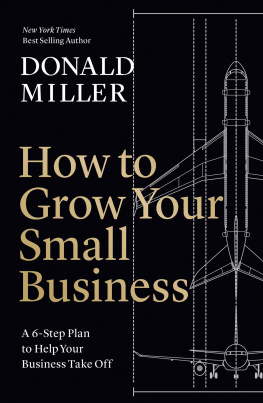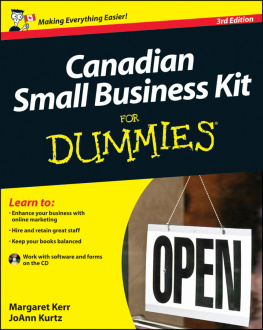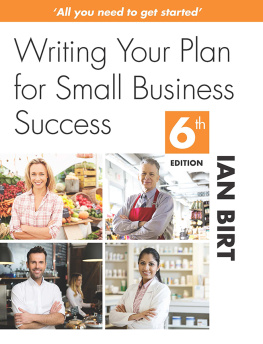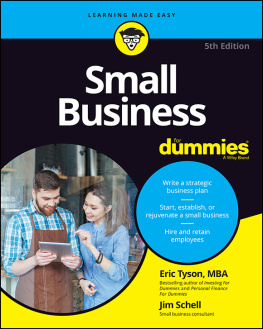Business Adventures:
A Beginners Guide to
Becoming a Pro
In Business
I ntroduction
Chapter 1: First Steps to Business Ownership
Chapter 2: Building Your Foundation
Chapter 3: Marketing Plans
Chapter 4: Financing
Chapter 5: Starting a Business With Zero $$$
Chapter 6: Tips if You Run Out of Money
Chapter 7: Legal Issues When Hiring Employees
Chapter 8: Summary of Key Concepts
Conclusion
Copyright 2016 by Larry Ellison
A ll rights reserved . This book or any portion thereof may not be reproduced or used in any manner whatsoever without the express written permission of the publisher except for the use of brief quotations in a book review or scholarly journal.
Although the author and publisher have made every effort to ensure that the information in this book was correct at press time, the author and publisher do not assume and hereby disclaim any liability to any party for any loss, damage, or disruption caused by errors or omissions, whether such errors or omissions result from negligence, accident, or any other cause.
Introduction
Hello and thank you for taking the time to check out this book!
Have you ever wanted to get started in the world of small business? Small business is something everyone can try, and often, its one of the best endeavors you can get started with. But with every small business comes the nuances of it, and for some, it might be startling. However, and you might feel that there is no way you can do this. However, it is possible, and this book will tell you exactly how.
This book will walk you through the ins and outs of owning your own business, including how to get started and how to achieve success with it. With a small business, it takes quite a bit of work, and with something new, it does need to be cultivated over time. However, this book will give you an insight on how to cultivate and grow a small business, and how to do so with success.
By the end of this book, youll know all that there needs to be known about this. With this book, youll be able to get started on the business venture youve always dreamed of. For many people, this can be a scary set of actions, but the second you take it, is the second youll start to see success. So what are you waiting for? Its time to create the small business of your dreams with this helpful and handy book.
Chapter 1: First Steps to Business Ownership
Congratulations! You have made the right first step in owning your own business, researching your options. Many people start new businesses without adequately preparing themselves legally or financially for their new endeavor. They have a great idea, as Im sure you do also, but they dont know exactly what is involved in starting the business so they drown in the details.
You wont drown because this book will prepare you for most contingencies. We have carefully researched the laws and business publications to bring you the most effective practices and procedures for a business start-up. If you are ready now to tackle the hard stuff, here we go.
Legal Matters
Are you a Sole Proprietorship, a Partnership, a LLC, or a Corporation? Before you go any further in your business foundation, this basic question must be answered. There are legal and tax repercussions for all of the structures, so it is best to be informed at the beginning.
A Sole Proprietorship is owned by only one person. This person is solely responsible for all the business matters, even though they may have trusted employees, including accountants or bookkeepers.
Sole Proprietorships are the simplest form of entrepreneurship. You may already be one; if you are a writer or a freelance graphic designer, photographer, or an independent contractor that does temporary work, you are a sole proprietor.
Your local laws have the specific requirements for a business license or permit, and you have to pay income taxes on your earnings, self-employment taxes, and all business debts. You must also file a DBA, Doing Business as, if you are operating under a name other than a part of your given name. For example, if you own Johns Photography you are not required to file a DBA, but if you are The Photography Shop you must file. The DBA will look like this: John Smith, Doing Business as The Photography Shop.
The detriment to being a sole proprietor is that you are personally responsible for your business debts. This means if you owe debts for payroll or taxes, you can be sued and lose any and all personal property.
Examples
Example 1: John owns a small business, a t-shirt silk screening shop. John opens his business and profits off a small town festival. Everyone wants a t-shirt with the town festival logo and year. John is so excited that he orders t-shirts by the gross in assorted sizes to meet the rushing demand. Then one day the festival is over, and John no longer has a hot product. Although he creates many custom designs, nothing comes close to the Festival t-shirt, and John falls behind on his debts. He cannot pay for the 16 gross boxes of t-shirts, and the manufacturer threatens to sue. John is responsible for this debt and his home and car and property are all at risk.
Example 2: Susan owns a cake decorating service that delivers the cakes to the wedding and social engagements. One day her driver, Samuel, is driving the van and comes to a yellow light. Samuel determines he is going too fast to stop without injuring the expensive cakes in the rear of the van. As Samuel moves through the intersection, his van is hit broadside by an oncoming car that now has a green light. Samuel is not hurt, but his van hit another car and the passenger was injured. The passenger sues Samuel and Susan because he was driving a company vehicle. The court stated that Samuel and Susan were liable because Samuel ran the yellow light. The plaintiff asked for medical reimbursement plus pain and suffering for time lost from work. Susan, as the owner of the business, is now responsible for paying a huge claim, or she will lose all her assets, including her home, her car, and the family land of which she is a partial owner.
The LLC and the Corporation have the advantage of protection from the debts of a business in the event of a closure. The law provides protection in the form of limited personal liability for the business obligations. This protection only extends to LLC, LLP, and corporations. If they are sued, they are allowed to keep personal property.
A partnership is an agreement between two or more people to share the obligations and profit of the business, according to the contract agreement they have signed. A general partnership is treated as sole proprietorship, with the business obligations and the bills attached to the personal property of the partners. Each partner, dependent upon their business share, must report their income to the IRS on a separate form, along with their regular income tax files.
Next page












